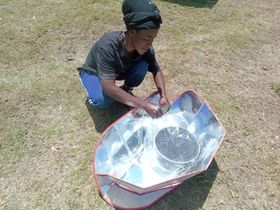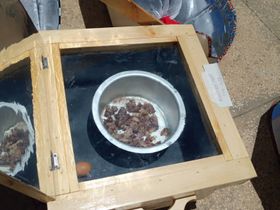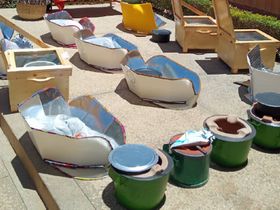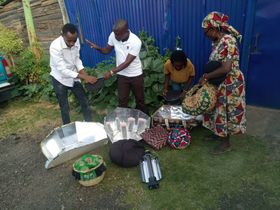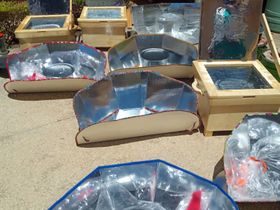Briquettes production
Briquettes are basically made using crop residues, biomass, dead leaves, rice, maize, sorghum stalks,... Unlike charcoal, briquettes do not emit any smoke, they are very economic and ecological. This innovation reduces the household cooking energy expenses, boots food productivity, improves health, avoids air pollution, protects the climate and environment, empowers women and helps consumers save time and money.
Our innovation brings a unique approach of cooking food without destroying trees. Briquettes are basically made using crop residues, biomass, dead leaves, rice, maize, sorghum stalks,... Unlike charcoal, briquettes do not emit any smoke, they are very economic and ecological. This innovation reduces the household cooking energy expenses, boots food productivity, improves health, avoids air pollution, protects natural resources and the environment, empowers women and helps consumers save time and money.
Solar Cooking
The Democratic Republic of Congo is among the developing countries in Africa where fire wood and charcoal are mainly the cooking energy. The techniques of Integrated Solar Cooking (ISC) is less known. However, they permit to get economic and ecological products of better quality. The country has much sunshine. Solar cookers and Dryers process food in an ecological way and without cost since the sunshine is a gift from God. The integrated solar cooking appliances and technologies are the unique means both to save the household expenses allocated to the cooking energy and to improve the livelihood, health of people and save the environment.
Training how to cook with a box solar cooker
What does solar cooker mean?
A solar cooker, or solar oven, is a device which uses the energy of sunlight to heat food or drink to cook it or sterilize it. High-tech versions, for example electric ovens powered by solar cells, are possible, and have some advantages such as being able to work in diffuse light.
Panel solar cooker
Box solar cooker frying meat
What is a solar cooker and how does it work?
A solar cooker lets the UV light rays in and then transforms them into longer infrared light rays that cannot escape. Infrared radiations have the energy to make the water, fat, and protein molecules in food vibrate energetically and heat up.
Diverse types of integrated solar cookers
Teaching Kelvin how to cook with solar
What is the use of solar cooker?
A solar cooker converts solar energy into heat, which is used to cook food kept in the cooking utensil. Solar cookers also enable some significant processes such as pasteurization and sterilization.
Box and panel solar cookers
Heat retaining baskets
What are the disadvantages of a solar cooker?
Disadvantages of a solar cooker : The cooking is slow. It connot be used at all times. A solar cooker can perform only limited functions. Solar cookers have limited utility at the places where sunlight is less as in polar regions or where there are too much rains
Help us promote clean cooking
Solar cooking is worth to reduce pollution and mitigate climate change


